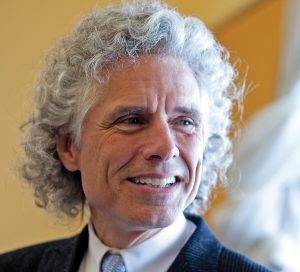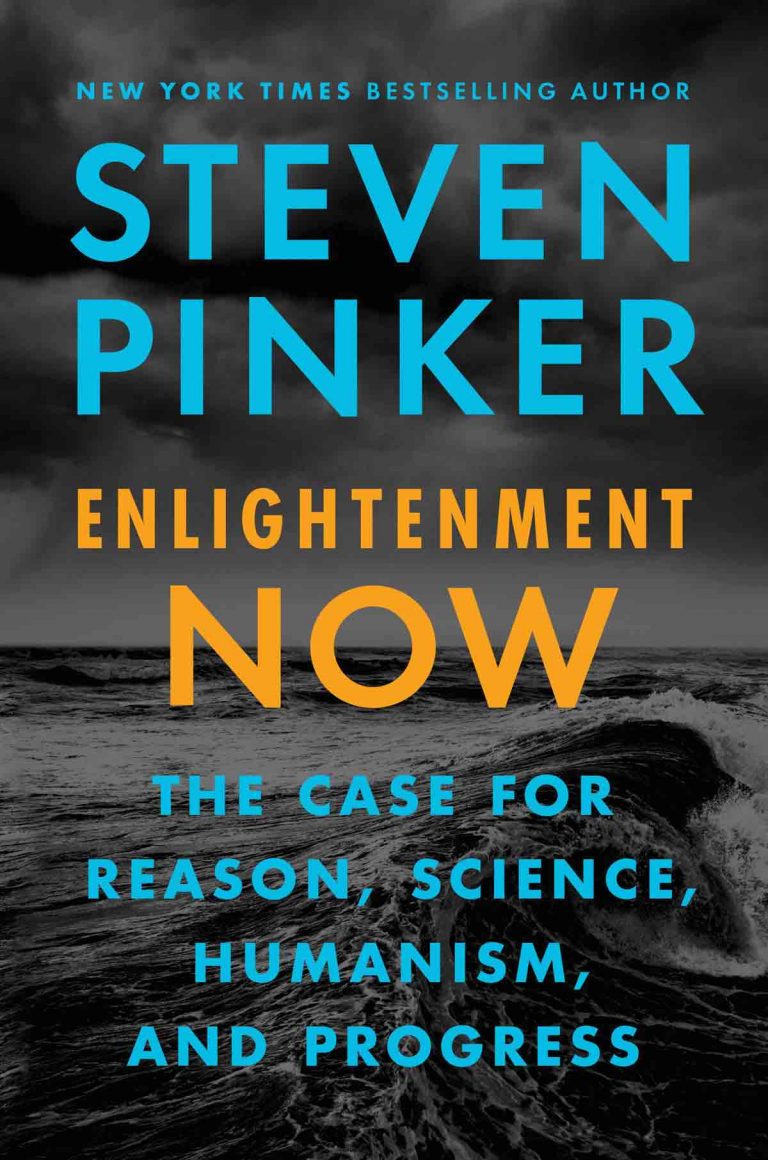Enlightenment Now: The Case for Reason, Science, Humanism, and Progress
By Steven Pinker
Viking, February 27, 2018
576 pp., $35, cloth
Is all the bad news these days getting you down? Do you feel as though society is descending into dystopia and the world into chaos? Take heart! Harvard psychologist and science popularizer Steven Pinker offers good news for you in his latest book, Enlightenment Now: The Case For Reason, Science, Humanism, and Progress. Just because it seems like the world is imploding, he writes, doesn’t mean that the world actually is imploding.
If that sounds counterintuitive or even Pollyannaish, picture that brake warning light in your car. Sometimes it lights up when your brakes are actually OK. There can be other causes for the warning; sometimes the light itself is faulty. In a similar way, lots of factors contribute to a negative appraisal of the world, Pinker says.
The problem may start with your college education, he writes. The liberal arts promote “prophets of doom,” Pinker charges, accusing Nietzsche, Foucault, “a chorus of eco-pessimists,” and others. Thus you might have been taught to be pessimistic. Then too, your own cognitive biases might be distorting your perception. Research has shown that people tend to judge the frequency of an event by how quickly and easily instances of the event come to mind. For example, because plane crashes make sensational news and auto crashes are seldom reported, many people fear flying, not driving, even though their odds of dying in a car wreck are higher. It’s similar with terrorism: the level of most people’s fear tends to be way out of sync with the degree of danger.
“Whether or not the world really is getting worse, the nature of news will interact with the nature of cognition to make us think that it is,” Pinker writes.
“News is about things that happen, not things that don’t happen. We never see a journalist saying to the camera, ‘I’m reporting live from a country where a war has not broken out’—or a city that has not been bombed, or a school that has not been shot up.”
How then can one accurately assess the current state of affairs? Look at the data, Pinker insists. Identify metrics that most people can agree on. “Life is better than death. Health is better than sickness. Sustenance is better than hunger. . . . All these can be measured. If they have increased over time, that is progress.”
The narrative that the world is going to hell is not merely misguided, Pinker believes, it is flat-wrong in a couldn’t‐be‐more‐wrong kind of way. “The world has made spectacular progress in every single measure of human well-being” (Pinker’s italics). The doom narrative is a kind of cultural myth, he contends—and a dangerous one, because it obscures the truth about the progress that has been made. When people aren’t aware of progress, they don’t appreciate it. When they don’t appreciate it, they don’t defend the values, organizations, and institutions that brought those gains about. They risk falling prey to a “smash the machine” kind of thinking. Enlightenment Now thus targets naysaying at both ends of the political spectrum.

Pinker has been on Time magazine’s list of Most Influential People in the World Today and on Foreign Policy’s list of Top 100 Global Thinkers. He knows how to lead a charge that counters conventional wisdom and advances controversial claims. His previous book—The Better Angels of Our Nature (a New York Times bestseller)—disputed the popular notion that historically violence is on the rise. In Enlightenment Now, Pinker draws on data from hundreds of sources to advance his case chart by chart (to a total of more than six dozen). Here are a few good reasons he cites for cheer: child mortality has gone down; undernourishment and famine deaths, down; rate of world population growth, down; number of oil spills, down (even though amount of oil shipped is up); average life span has gone up; IQ, up. In 15 domains—from health, wealth, and safety to quality of life and the environment—Pinker lays out the quantitative evidence that supports his core argument. He explains his reasoning clearly. The reader follows his logic step by step, willing him to be right.
In Pinker’s recounting, all this progress derives from classic liberal ideals passed down by the Enlightenment, a late 18th-century to early 19th-century European and American philosophical movement. Enlightenment thinkers such as John Locke, Thomas Hobbes, David Hume, Immanuel Kant, and Isaac Newton proposed a radically new understanding of what it means to be human, Pinker writes, in the wake of bloody religious wars and in response to expanding frontiers of knowledge from the scientific revolution and geographical exploration. The thinkers are linked by four themes, Pinker declares: reason, science, humanism, and progress. Promoting these classic liberal values in today’s civic life is his goal.
At the opening of the book, the author tells a story that is key to understanding his driving motivation. He was giving a talk, explaining a view “commonplace among scientists that mental life consists of patterns of activity in the tissues of the brain.” (Pinker is a materialist and believes that science has settled the problem of consciousness. On certain controversial matters like this one, he can maddeningly exaggerate the degree of scholarly consensus.) A woman in the audience raised her hand and asked with evident sincerity, “Why should I live?” This question gave him pause. It made him decide that there is a need for a clear statement of Enlightenment ideals, and that these ideals need “a vigorous defense.”
This defense of Enlightenment ideals is a more problematic aspect of the book. It is also where the going gets more interesting for critically minded Buddhist readers.
Morphing from scientist to proselytizer, Pinker labors to convince his readers that material progress is in and of itself a valid moral end, and that progress, together with those “inspiring,” “stirring,” and “noble” values that have brought it about—reason, science, and humanism—are sufficient existential grounds to provide a reason to live. In other words, he preaches secular humanism as an adequate and fulfilling spiritual path to meet the fundamental human longing for meaning and purpose in a world that (he assumes) is devoid of God and supernatural forces—a world that (he thinks) is comprehensively understood by rationalism, thoroughly explained by mechanistic, materialist, and objectivist science, and appropriately governed by values deemed universal.
Pinker proceeds to outline these ideals and defend them against varied detractors, from religious fundamentalists and populists to professors, pundits, and even the Green Party. Unfortunately, preacher Pinker alienates the congregation. He sermonizes condescendingly, attacking straw men his audience is likely to be sympathetic to and mischaracterizing their intellectual sins. His often sarcastic tone counters rather than promotes his goal of persuasion. He writes, for example: “Intellectuals hate progress. Intellectuals who call themselves ‘progressive’ really hate progress. It’s not that they hate the fruits of progress, mind you: most pundits, critics, and their bien-pensant readers use computers rather than quills and inkwells. . . . It’s the idea of progress that rankles the chattering class—the Enlightenment belief that by understanding the world we can improve the human condition.”
Many Buddhist readers already subscribe to the values that Pinker promotes. Nonetheless, they will likely rankle at his implication that thinkers who “apply reason and sympathy to enhance human flourishing” were unique to the European Enlightenment. After all, haven’t Buddhist thinkers done the same since long before the Western Enlightenment? Don’t all peoples in all cultures do that?
Well, actually no, because Pinker conflates all reason with a particular kind. “We must allow the world to tell us whether our ideas about it are correct,” he writes. “The traditional causes of belief—faith, revelation, dogma, authority, charisma, conventional wisdom, hermeneutic parsing of texts, the glow of subjective certainty—are generators of error, and should be dismissed as sources of knowledge. Instead our beliefs about empirical propositions should be calibrated by their fit to the world.”
Buddhists may object that there are many ways the world can show us whether our ideas about it are correct. After all, the most exalted form of knowledge for Buddhists is not reason but insight. And is it not the case that faith has its own kind of reason? That hermeneutics too involves arguments and evidence, and that subjective certainty is sometimes the most reliable form of knowledge? (Consider a musician who is tuning her instrument by ear.) As cultural critic Curtis White told Tricycle in the Spring 2014 issue, art too thinks.
Using a similar sleight of hand, Pinker conflates reason with science. “Today most philosophers (at least in the analytic or Anglo-American tradition) subscribe to naturalism, the position that reality is exhausted by nature, containing nothing ‘supernatural’ and that the scientific method should be used to investigate all areas of reality, including the ‘human spirit,’” writes Pinker—a statement that many Buddhists, not to mention humanists and social scientists, would disagree with. “Science, in the modern conception, is of a piece with philosophy and with reason itself.”
This kind of trademark-Pinker scientism makes it difficult at times for the reader to discern where the philosophical and scientific facts end and Pinker revisionism begins. In a similar way, Pinker tends to read the Enlightenment past through his own convictions from the present, so it can be difficult to tell where the historical facts end and Pinker’s modern biases begin. Of course the worldview Pinker promotes doesn’t seem biased to him, but his assertions that the world is material, mechanistic, and mind-independent show up as assumptions when contrasted with Buddhist worldviews. It is important for readers to keep in mind that these characteristics are not outcomes of science but presumptions of science, and of only a particular—historically contingent—strain of science at that. So whether Pinker’s portrayal of the Enlightenment is accurate remains an open question and is something for historians and philosophers—and, I recommend, the reader—to assess.
The book’s main value to Buddhists is the question it poses whether material flourishing—which no Buddhist would deny is nice to have—can constitute a reason to live. Many Western Buddhists and mindfulness practitioners promote this view and practice Buddhism or meditation in the service of these sorts of Western Enlightenment ideals. But from a traditional Buddhist perspective, all the trophies that Pinker displays as the proof of Enlightenment victories cannot outshine the first noble truth. Even if arguably more people do have longer life spans, fewer diseases, better nutrition, and so forth, they remain existentially vulnerable. They will suffer at birth and be subject to inevitable sickness, old age, and death. They will continue to not get what they want, get what they don’t want, or get what they want but be unable to keep it. And ultimately, as long as they are interpreting any experience as intrinsically real—whether that be wealth or poverty, peace or war, a salubrious environment or a polluted one—they will continue to suffer the habit of clinging.
The kind of enlightenment Pinker promotes posits that happiness depends on external circumstances. For that reason, the world can, should, and must be fixed. But from a Buddhist perspective, even if all material problems could be solved, suffering would remain. The world is unfixable, said Buddha. Happiness depends, ultimately, only on the mind; it is the mind that can, should, and must be fixed. But when spiritual problems are solved, no suffering remains.
In comparison to the Buddha’s good news, Pinker’s seems downright pessimistic.
Thank you for subscribing to Tricycle! As a nonprofit, we depend on readers like you to keep Buddhist teachings and practices widely available.
